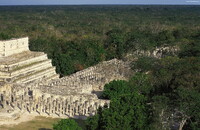Chichén Itzá
unknown (Maya)

Download1A3-M-M-CI-C4_cp.jpg (831.3Kb)
Date
900-1521Description
Complex of the Thousand Columns, general view; Site of Pre-Columbian Maya and Toltec city in the Yucatán peninsula, Mexico. It flourished during the Post-Classic period (ca. 900-1521 CE). Chichén Itzá ('mouth of the well of the Itzá') is named after its 'Sacred Cenote', a natural limestone sinkhole that served as a focus for pilgrimages and sacrificial offerings. Close artistic correspondences between Chichén Itzá and Tula in Hidalgo have suggested that the Central-Highland Mesoamericans invaded Yucatán and forced the local Maya to construct buildings and carve sculptures featuring their own forms and motifs. Central Mexican architectural elements include colonnaded structures, serpent columns and balustrades, and walls with sloping base sections. Sculptures show a preference for serial group arrangements and narrative compositions. Warrior figures with 'pillbox' headdresses, butterfly pectorals and atlatls (spearthrowers) are prominent, along with depictions of warrior animal totems (jaguars and eagles), chacmools (reclining offertory figures) and Central Mexican gods such as Tezcatlipoca and Tlalchitonatiuh. Source: Grove Art Online; http://www.groveart.com/ (accessed 1/13/2008)
Type of Work
excavation (site); historic siteSubject
architectural exteriors, deities, military, war, Mesoamerican, Postclassic, Toltec, Maya
Rights
Rights Statement
Licensed for educational and research use by the MIT community only